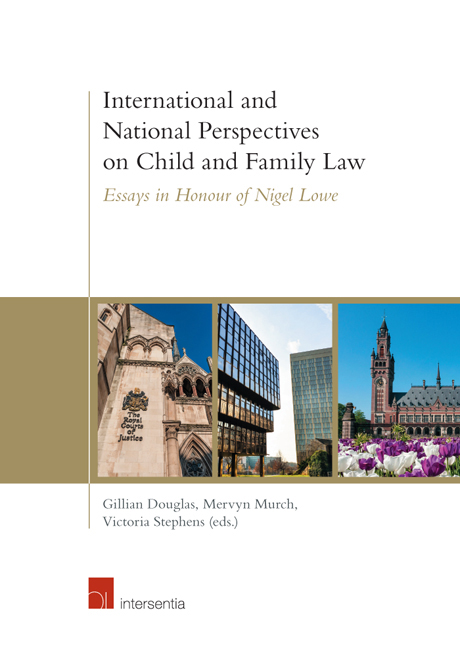Book contents
- Frontmatter
- Foreword
- Acknowledgements
- Contents
- List of Cases
- List of Contributors
- Introduction: Nigel Vaughan Lowe: An Appreciation
- Part I Family and Child Law in England and Wales
- The Supreme Court and Family Law
- The Development of Parent–Child Relationships in Family Law: The Cascade of Change
- Commitment-Based Parenting: Parental Responsibility in English Law
- Rights Children Should Not Have
- Empirical Research on Adoption of Children from Care
- Pathways to Adoption: From Long and Winding Road to Obstacle Course?
- Child Abuse and Public Inquiry Methodologies
- Lowe and the Inherent Jurisdiction
- Wards of Court
- Part II International Family Law
- Part III The Future for Family and Child Law
Pathways to Adoption: From Long and Winding Road to Obstacle Course?
from Part I - Family and Child Law in England and Wales
Published online by Cambridge University Press: 12 October 2018
- Frontmatter
- Foreword
- Acknowledgements
- Contents
- List of Cases
- List of Contributors
- Introduction: Nigel Vaughan Lowe: An Appreciation
- Part I Family and Child Law in England and Wales
- The Supreme Court and Family Law
- The Development of Parent–Child Relationships in Family Law: The Cascade of Change
- Commitment-Based Parenting: Parental Responsibility in English Law
- Rights Children Should Not Have
- Empirical Research on Adoption of Children from Care
- Pathways to Adoption: From Long and Winding Road to Obstacle Course?
- Child Abuse and Public Inquiry Methodologies
- Lowe and the Inherent Jurisdiction
- Wards of Court
- Part II International Family Law
- Part III The Future for Family and Child Law
Summary
INTRODUCTION
In the late 1980s and 1990s, while he was Reader in Law at Bristol University and later as a Professor at CardiffUniversity, Nigel Lowe was a part of a research team which undertook three major studies on adoption. The Pathways to Adoption study examined the operation of adoption law, highlighting the different routes to an adoption order and the time these took. It revealed a complex system and one with some very concerning features: there was ‘avoidable delay’ and the process took too long for children; birth parents had no effective means of challenging adoption plans they objected to; and the legal process served adopters poorly.
The Adoption Act 1976 provided two pathways to adoption for children who could not be cared for in their families: an adoption agency could either apply to the court for an order to ‘free for adoption’ or place the child relying on the parents’ agreement or a care order, which restricted the parents’ right to remove their child. The freeing process also allowed parents, mainly single mothers, to give up their child quickly, before an adoption order could be made. It also ensured that prospective adopters were protected from any challenge to their adoption, and that the reasonableness of the birth parents’ refusal to consent was assessed without reference to the child's care in another family.
In practice, the pathways presented many difficulties. The time taken for the double process, freeing and adoption, was too long. Consequently, agencies continued to plan adoptions without freeing; in 1996, only 29 per cent of agency adoptions were preceded by a freeing order. Without a freeing order, parents who opposed adoption were not pitted against the agency but against adopters, who had been assessed as suitable and were successfully caring for a child. The adopters were faced with presenting the case for dispensing with the parents’ agreement but had no right of access to the agency’ s records. Almost all orders were granted: whether this reflected agency decisions only to plan adoption where an order was certain, or a system unfairly skewed against birth parents’ interests, was unclear.
This research contributed to the debates around adoption law which culminated in the Adoption and Children Act 2002.
- Type
- Chapter
- Information
- International and National Perspectives on Child and Family LawEssays in Honour of Nigel Lowe, pp. 81 - 96Publisher: IntersentiaPrint publication year: 2018



